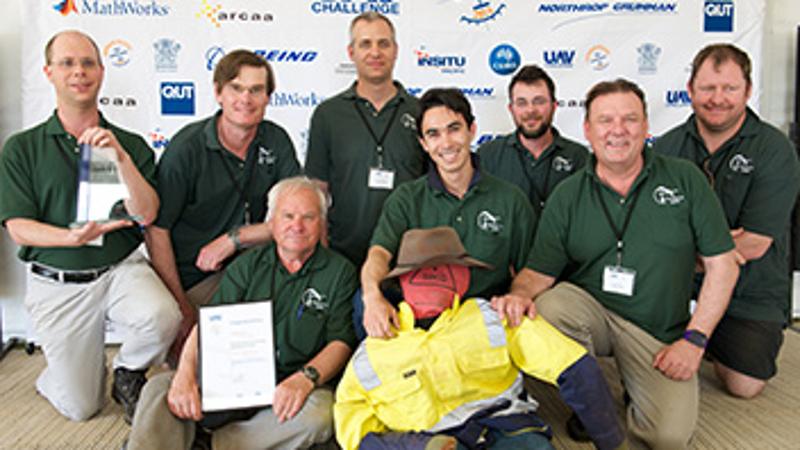
After seven years in the wilderness, four teams have made history, using their unmanned aerial vehicles (UAVs) to both find a 'lost' hiker and deliver him emergency rations.
Hosted by QUT and CSIRO, the UAV Challenge - Outback Research competition attracted 22 teams from around the world and was staged at Kingaroy airport.
Aviation hobbyists CanberraUAV took home the title and $50,000 first prize.
"It's been a three and a half year journey for us," team manager Stephen Dade said.
"We almost won the prize in 2012, but just missed out. It's great that we finally completed the mission."
The overall winner was decided on points, awarded by how closely the team dropped their ration to Outback Joe and how well they answered pre-mission questions from judges.
Competition co-founder and head judge Professor Jonathan Roberts from QUT's Science and Engineering Faculty said completing the mission was a world first.
"We're not aware of anyone else successfully using cost-effective UAVs for sophisticated search and rescue purposes such as this," he said.
"Having so many teams complete such a difficult task in one year is amazing - the technology has matured and the teams have had time to practice and innovate over the years.
"It was fantastic to see so many teams from previous competitions sharing their knowledge to the benefit of this year's cohort.
"The fact that hobbyists have proved they can build robotic aircraft capable of performing search-and-rescue missions gives hope that, one day, very cheap aircraft systems can be used widely by the emergency services and volunteers."
Melbourne brothers Daniel and Ben Dyer, who make up team SFWA, were the first team to locate Outback Joe and deliver him a care package since the competition launched in 2007.
"We built the autopilot from scratch," Daniel Dyer said.
"For guidance navigation and control we used an Unscented Kalman filter. For flight control we used a non-linear model predictive controller.
"The experience has been great. I've learnt a lot and met a lot of people with similar interest."
The other two teams to successfully complete the mission were Robota and Team Thunder.
Professor Roberts said organisers would now take a break from the annual search and rescue mission.
"We'll take some time to consider what the next challenge should be, taking into account the needs of UAV industry," Professor Roberts said.
"We have been waiting 2,558 days since Day 1 of the very first UAV Challenge. We all just wish that co-founder, Professor Rod Walker, who sadly passed away in 2011, was here to share the achievement with the successful teams."
The 2014 UAV Challenge was sponsored by Insitu Pacific, Northrop Grumman, Boeing, CASA, Mathworks, Stanwell and DSTO. It was also supported by the Queensland Government, UAS Pacific, Raytheon Australia and The Australian Association for Unmanned Systems.
Teams that completed the mission:
1st. Canberra UAV (ACT)
2nd. Robota (USA)
3rd. SFWA (VIC)
4th. Team Thunder (NSW)
RELATED STORIES
UAV Challenge Outback Rescue a flying success
High school high flyers on UAV rescue mission
Unmanned Aircraft: Countdown to Mission Possible
Media contact:
Katalin Csatlos
Kate Haggman, QUT Media, 07 3138 0358, kate.haggman@qut.edu.au
After hours Rose Trapnell, 0407 585 901.


